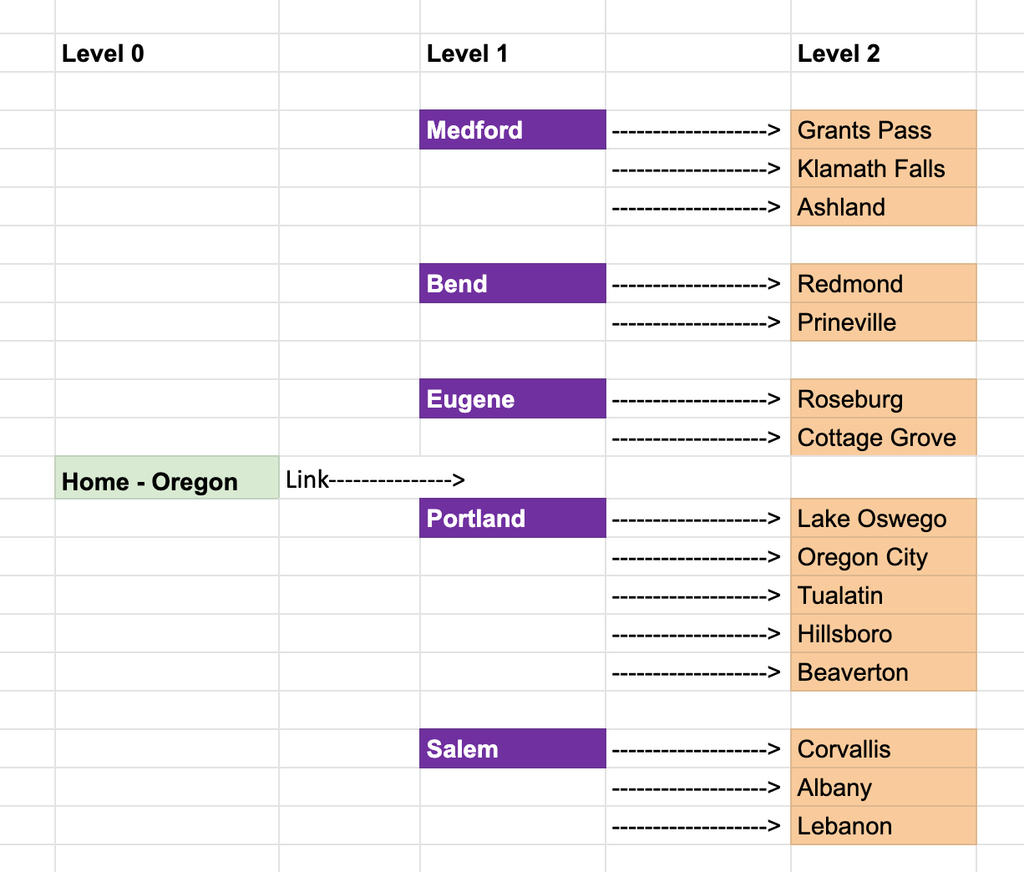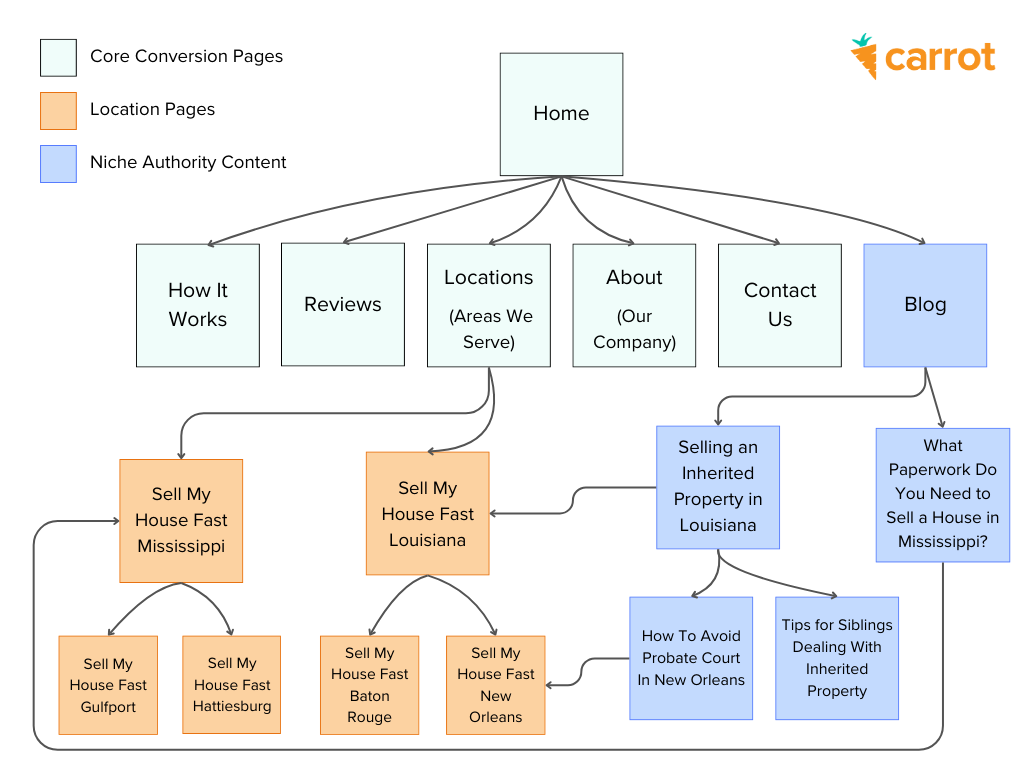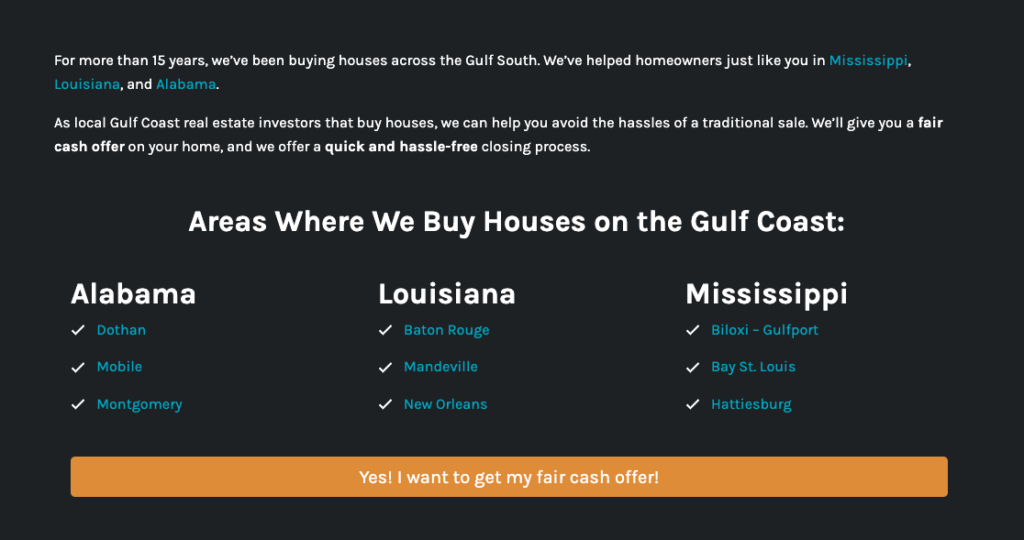Wondering about the right strategy for your location pages?
Here are the answers to some of the most common strategy questions we get asked about location pages:
- What location should I focus on for my home page?
- Can multiple locations be targeted with one website?
- What about incorporating counties?
- What areas should I create location pages for?
- How should real estate agents use locations pages?
- How can I take my business nationwide?
- How should I link to location pages from my homepage?
- Can I hire you to create location pages for me?
What location should I focus on for my home page? Should I target a state, a city, or should it be focused on a broader area?
This is one of the most common strategy questions that we hear from Carrot customers, so we created a full tutorial about it:
ℹ️ Determine The Location Focus of Your Home Page
Can multiple locations be targeted with one website?
The short answer is yes. There is a balance though.
Does it make sense to your site’s visitors, or will they feel like your different locations don’t apply to them? Is there a clear organization and navigation on your website so that visitors don’t feel overwhelmed or confused by the number of locations? Read this tutorial to learn more about determining your location focus for your home page and overall location strategy.
What about incorporating counties?
We generally don’t recommend using counties on location pages for two reasons:
- Not all states use counties; for example, Louisiana still uses parishes and Alaska uses the term boroughs instead of counties. This might be semantics, but for clarity’s sake, it’s simpler to stick with cities and states.
- People aren’t typically using county names when searching for homes or services. Even if the city location does not appear to be as accurate in comparison, a city location page will be much more likely to be used on a Google search. You can also have as many city pages as you would like. So if you want to include all of the cities within their county, you are welcome to do so!
What areas should I create location pages for?
How small or large of a population does the area need to have for it to make sense to create a location page?
Generally, you’ll want to create location pages for areas that have a somewhat sizable population and a decent location-specific search volume. You can use a keyword research tool like Carrot’s Keyword Explorer to determine the search volume of specific keyword phrases.
However, just because a keyword or location doesn’t have a ton of searches each month, doesn’t mean it’s not worth trying to rank for – especially if you have a newer website. Many low volume keywords can often be easier to rank, and sometimes getting ranked for smaller volume keyword phrases can help boost your rankings on other pages as well. For this reason, some of our members find that targeting smaller areas can be beneficial for overall rankings.
It depends on how relevant the specific location and keyword is to your business goals. You’ll also need to evaluate the time and energy it will take to create these location pages against how much value they’ll bring to your particular business.
There is a balance with SEO as well. Too many location pages can bog down SEO if not executed properly. You will need a clear website structure (hierarchy) and more backlinks to support a large site with lots of pages. As you create more location pages, make sure your website structure and internal linking is logical from State > Larger Cities > Surrounding cities.
Our Auto-Location Pages feature speeds up the process of creating location pages and automatically creates the internal linking for you.
I’m a real estate agent. What’s the best way for agents to use locations pages?
The strategy is the same as investors. SEO is SEO.
First, determine the location focus of your home page based your overall business goals for the coming years. The keyword phrase you target with your home page can be used to target additional areas with location pages.
For example, if your home page targets the keyword phrase “Real estate agents in PRIMARY CITY” you can then create location pages for “Real estate agents in SECONDARY CITY”.
Agents have the added benefit of targeting “Homes for sale” keyword phrases with the addition of IDX and property listings.
I want to take my business nationwide. What should I do?
🚨 NOTE: A nationwide SEO and marketing strategy is much more competitive and complicated than focusing on a specific regional market.
If you’re focused on doing business nationwide, your homepage should be focused on your company’s brand rather than a specific location. You’ll want to build out state location pages for each state you do business in, then build out any city location pages as child pages under the state pages. So your URLs might look something like:
- Homepage:
trustedhomebuyers.com - State location page:
trustedhomebuyers.com/california - City location page:
trustedhomebuyers.com/california/sacramento
For nationwide websites, we typically recommend building out your location pages manually instead of using our Auto-Location pages feature so that you can customize each of your state and city location pages to be very specific to each geographic area.
(Auto-Location pages are great if you want a fast and easy way to mirror the content on your home page. They work great for websites focused on a specific geographic region, like 1 or 2 states, but for larger nationwide sites we recommend further customizing the content on each location page.)
Nationwide websites are highly competitive and you’ll need a strong plan for off-site SEO, including citations, backlinks, press & publicity, and social media. Learn more about off-site SEO.
Learn more in this video about how to do nationwide SEO as a real estate investor:

I’m confused about website structure and internal linking. How should I link to my other location pages from my homepage?
Organizing your pages and linking them methodically with a top-down structure (from state to city, and possibly major city to smaller nearby cities) helps show Google which pages you want to rank in order of importance.
The hierarchy you build with internal links distributes the SEO power from your home page deeper into your site. An organized internal link structure lets Google know what pages are most important, second most important, and so on.
There are a few different ways to do this, depending on the location you’ll be focusing on for your home page.
For example, below is a planned site structure for a website where the home page will focus on the state of Oregon. The home page will link to city location pages for major cities like Portland, Eugene and Salem. Those city pages will then link internally to additional location pages for smaller cities like Roseburg and Corvallis:

Here’s another example for a motivated seller website focused on two different states that are geographically close to each other (Louisiana and Mississippi):

In a situation like the example above, where you serve an entire region and have many state and/or city location pages, you may want to create an Areas We Serve page. (You can call it whatever you’d like: “Locations” or “Service Areas” also works well.) You can add this page to your main navigation menu, similar to your other core conversion pages like your About page. On this “Areas We Serve” page, you can add a list of all of your different state and/or city location pages and link to each of them.
You can also add an Areas We Serve section on your homepage using the Visual Editor, with lists linking to the location pages that are most important to your business. (This is similar to what’s automatically created by the Auto Location Pages feature.)
You can also link internally to your location pages within the text content of your website’s posts or pages where relevant. In the example below, we’ve linked to the state pages in the paragraph at the top of the “Areas We Serve” section:

Watch this video to see how to create an Areas We Serve section, or follow the steps in this tutorial:
If you have a very large number of location pages, we don’t recommend linking to all of them from your home page or footer. This could create an overwhelming experience for your website’s visitors and could confuse Google about which location pages are most important. Instead, you can feature a handful of the most important pages in an “Areas We Serve” section on your home page (as shown above) and/or create an “Areas We Serve” page to link to the full list of all of your location pages.
You can also link internally to your most important location pages within the content of related blog posts and niche authority pages. For example, a blog post titled “What Paperwork Do You Need to Sell a House in Mississippi?” would link to your Mississippi state page.
If this sounds complicated, don’t worry! Once you’ve determined the location focus of your home page, you can use our Auto-Location pages feature to mirror your homepage in minutes and quickly create secondary state and/or city location pages, with the internal linking created for you automatically.
Can I hire you to create location pages for me?
Ready to expand your business to a larger area but don’t have the time or desire to do this yourself?
If you need some help creating a location page strategy for your business, head over to our Marketplace of in-house Carrot services and trusted vendors. Our Location Pages Service is one of many “done-for-you” services we offer.
New to Carrot?
Welcome!

Here’s our full guide for what to do when getting started with your Carrot website:
Want Us to do Some
Editing for You?

You are busy doing what you do best, running your business. Leave the site work in Carrot’s hands.

